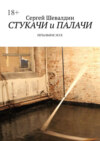Читать книгу: «Mademoiselle of Monte Carlo», страница 8
“What do you think of the English police, madame?” Hugh asked. The fat woman grinned expressively and shrugged her broad shoulders.
“Since the war they have been effete as regards serious crime. At least, that is what Il Passero told me when he was here a month ago.”
“Someone is coming here to meet Monsieur Henfrey,” Vervoort said. “Who is it?”
“I don’t know. I only received word of it the day before yesterday. A messenger from London, I believe.”
“Well, each day I become more and more mystified,” Hugh declared. “Why Il Passero, whom I do not know, should take all this interest in me, I cannot imagine.”
“Il Passero very often assists those against whom a false charge is laid,” the woman remarked. “There is no better friend when one is in trouble, for so clever and ubiquitous is he, and so many friends in high quarters does he possess, that he can usually work his will. His is the master-mind, and we obey without question.”
TWELFTH CHAPTER
THE STRANGER IN BOND STREET
As Dorise walked up Bond Street, smartly dressed, next afternoon, on her way to her dressmaker’s, she was followed by a well-dressed young girl in black, dark-eyed, with well-cut, refined features, and apparently a lady.
From Piccadilly the stranger had followed Dorise unseen, until at the corner of Maddox Street she overtook her, and smiling, uttered her name.
“Yes,” responded Doris in surprise. “But I regret—you have the advantage of me?”
“Probably,” replied the stranger. “Do you recollect the bal blanc at Nice and a certain white cavalier? I have a message from him to give you in secret.”
“Why in secret?” Dorise asked rather defiantly.
“Well—for certain reasons which I think you can guess,” answered the girl in black, as she strolled at Dorise’s side.
“Why did not you call on me at home?”
“Because of your mother. She would probably have been a little inquisitive. Let us go into some place—a tea-room—where we can talk,” she suggested. “I have come to see you concerning Mr. Henfrey.”
“Where is he?” asked Dorise, in an instant anxious.
“Quite safe. He arrived in Malines yesterday—and is with friends.”
“Has he had my letters?”
“Unfortunately, no. But do not let us talk here. Let’s go in yonder,” and she indicated the Laurel Tea Rooms, which, the hour being early, they found, to their satisfaction, practically deserted.
At a table in the far corner they resumed their conversation.
“Why has he not received my letters?” asked Dorise. “It is nearly a month ago since I first wrote.”
“By some mysterious means the police got to know of your friend’s intended visit to Brussels to obtain his letters. Therefore, it was too dangerous for him to go to the Poste Restante, or even to send anyone there. The Brussels police were watching constantly. How they have gained their knowledge is a complete mystery.”
“Who sent you to me?”
“A friend of Mr. Henfrey. My instructions are to see you, and to convey any message you may wish to send to Mr. Henfrey to him direct in Malines.”
“I’m sure it’s awfully good of you,” Dorise replied. “Does he know you are here?”
“Yes. But I have not met him. I am simply a messenger. In fact, I travel far and wide for those who employ me.”
“And who are they?”
“I regret, but they must remain nameless,” said the girl, with a smile.
Dorise was puzzled as to how the French police could have gained any knowledge of Hugh’s intentions. Then suddenly, she became horrified as a forgotten fact flashed across her mind. She recollected how, early in the grey morning, after her return from the ball at Nice, she had written and addressed a letter to Hugh. On reflection, she had realized that it was not sufficiently reassuring, so she had torn it up and thrown it into the waste-paper basket instead of burning it.
She had, she remembered, addressed the envelope to Mr. Godfrey Brown, at the Poste Restante in Brussels.
Was it possible that the torn fragments had fallen into the hands of the police? She knew that they had been watching her closely. Her surmise was, as a matter of fact, the correct one. Ogier had employed the head chambermaid to give him the contents of Dorise’s waste-paper basket from time to time, hence the knowledge he had gained.
“Are you actually going to Malines?” asked Dorise of the girl.
“Yes. As your messenger,” the other replied with a smile. “I am leaving to-night. If you care to write him a letter, I will deliver it.”
“Will you come with me over to the Empress Club, and I will write the letter there?” Dorise suggested, still entirely mystified.
To this the stranger agreed, and they left the tea-shop and walked together to the well-known ladies’ club, where, while the mysterious messenger sipped tea, Dorise sat down and wrote a long and affectionate letter to her lover, urging him to exercise the greatest caution and to get back to London as soon as he could.
When she had finished it, she placed it in an envelope.
“I would not address it,” remarked the other girl. “It will be safer blank, for I shall give it into his hand.”
And ten minute later the mysterious girl departed, leaving Dorise to reflect over the curious encounter.
So Hugh was in Malines. She went to the telephone, rang up Walter Brock, and told him the reassuring news.
“In Malines?” he cried over the wire. “I wonder if I dare go there to see him? What a dead-alive hole!”
Not until then did Dorise recollect that the girl had not given her Hugh’s address. She had, perhaps, purposely withheld it.
This fact she told Hugh’s friend, who replied over the wire:
“Well, it is highly satisfactory news, in any case. We can only wait, Miss Ranscomb. But this must relieve your mind, I feel sure.”
“Yes, it does,” admitted Dorise, and a few moments later she rang off.
That evening Il Passero’s chic messenger crossed from Dover to Ostend, and next morning she called at Madame Maupoil’s, in Malines, where she delivered Dorise’s note into Hugh’s own hand. She was an expert and hardened traveller.
Hugh eagerly devoured its contents, for it was the first communication he had had from her since that fateful night at Monte Carlo. Then, having thanked the girl again, and again, the latter said:
“If you wish to write back to Miss Ranscomb do so. I will address the envelope, and as I am going to Cologne to-night I will post it on my arrival.”
Hugh thanked her cordially, and while she sat chatting with Madame Maupoil, sipping her cafe au lait, he sat down and wrote a long letter to the girl he loved so deeply—a letter which reached its destination four days later.
One morning about ten days afterwards, when the sun shone brightly upon the fresh green of the Surrey hills, Mrs. Bond was sitting before a fire in the pretty morning room at Shapley Manor, a room filled with antique furniture and old blue china, reading an illustrated paper. At the long, leaded window stood a tall, fair-faced girl in a smart navy-suit. She was decidedly pretty, with large, soft grey eyes, dimpled cheeks, and a small, well-formed mouth. She gazed abstractedly out of the window over the beautiful panorama to where Hindhead rose abruptly in the blue distance. The view from the moss-grown terrace at Shapley, high upon the Hog’s back, was surely one of the finest within a couple of hundred miles of London.
Since Mrs. Bond’s arrival there she had had many callers among the nouveau riche, those persons who, having made money at the expense of our gallant British soldiers, have now ousted half the county families from their solid and responsible homes. Mrs. Bond, being wealthy, had displayed her riches ostentatiously. She had subscribed lavishly to charities both in Guildford and in Farnham, and hence, among her callers there had been at least three magistrates and their flat-footed wives, as well as a plethoric alderman, and half a dozen insignificant persons possessing minor titles.
The display of wealth had always been one of Molly Maxwell’s games. It always paid. She knew that to succeed one must spend, and now, with her recently acquired “fortune,” she spent to a very considerable tune.
“I do wish you’d go in the car to Guildford and exchange those library books, Louise,” exclaimed the handsome woman, suddenly looking up from her paper. “We’ve got those horrid Brailsfords coming to lunch. I was bound to ask them back.”
“Can’t you come, too?” asked the girl.
“No. I expect Mr. Benton this morning.”
“I didn’t know he was back from Paris. I’m so glad he’s coming,” replied the girl. “He’ll stay all the afternoon, of course?”
“I hope so. Go at once and get back as soon as you can, dear. Choose me some nice new books, won’t you?”
Louise Lambert, Benton’s adopted daughter, turned from the leaded window. In the strong morning light she looked extremely charming, but upon her countenance there was a deep, thoughtful expression, as though she were entirely preoccupied.
“I’ve been thinking of Hugh Henfrey,” the woman remarked suddenly. “I wonder why he never writes to you?” she added, watching the girl’s face.
Louise’s cheeks reddened slightly, as she replied with affected carelessness:
“If he doesn’t care to write, I shall trouble no longer.”
“He’s still abroad, is he not? The last I heard of him was that he was at Monte Carlo with that Ranscomb girl.”
Mention of Dorise Ranscomb caused the girl’s cheeks to colour more deeply.
“Yes,” she said, “I heard that also.”
“You don’t seem to care very much, Louise,” remarked the woman. “And yet, he’s such an awfully nice young fellow.”
“You’ve said that dozens of times before,” was Louise’s abrupt reply.
“And I mean it. You could do a lot worse than to marry him, remember, though he is a bit hard-up nowadays. But things with him will right themselves before long.”
“Why do you suggest that?” asked the girl resentfully.
“Well—because, my dear, I know that you are very fond of him,” the woman laughed. “Now, you can’t deny it—can you?”
The girl, who had travelled so widely ever since she had left school, drew a deep breath and, turning her head, gazed blankly out of the window again.
What Mrs. Bond had said was her secret. She was very fond of Hugh. They had not met very often, but he had attracted her—a fact of which both Benton and his female accomplice were well aware.
“You don’t reply,” laughed the woman for whom the Paris Surete was searching everywhere; “but your face betrays the truth, my dear. Don’t worry,” she added in a tone of sympathy. “No doubt he’ll write as soon as he is back in England. Personally, I don’t believe he really cares a rap for the Ranscomb girl. It’s only a matter of money—and Dorise has plenty.”
“I don’t wish to hear anything about Mr. Henfrey’s love affairs!” cried the girl petulantly. “I tell you that they do not interest me.”
“Because you are piqued that he does not write, child. Ah, dear, I know!” she laughed, as the girl left the room.
A quarter of an hour later Louise was seated in the car, while Mead drove her along the broad highway over the Hog’s Back into Guildford. The morning was delightful, the trees wore their spring green, and all along in the fields, as they went over the high ridge, the larks were singing gaily the music of a glad morning of the English spring, and the view spread wide on either side.
Life in Surrey was, she found, much preferable to that on the Continent. True, in the Rue Racine they had entertained a great deal, and she had, during the war, met many very pleasant young English and American officers; but the sudden journey to Switzerland, then on into Italy, and across to New York, had been a whirl of excitement. Mrs. Maxwell had changed her name several times, because she said that she did not want her divorced husband, a ne’er-do-well, to know of her whereabouts. He was for ever molesting her, she had told Louise, and for that reason she had passed in different names.
The girl was in complete ignorance of the truth. She never dreamed that the source of the woman’s wealth was highly suspicious, or that the constant travelling was in order to evade the police.
As she was driven along, she sat back reflecting. Truth to tell, she was much in love with Hugh. Benton had first introduced him one night at the Spa in Scarborough, and after that they had met several times on the Esplanade, then again in London, and once in Paris. Yet while she, on her part, became filled with admiration, he was, apparently, quite unconscious of it.
At last she had heard of Hugh’s infatuation for Dorise Ranscomb, the daughter of the great engineer who had recently died, and indeed she had met her once and been introduced to her.
Of the conditions of old Mr. Henfrey’s will she was, of course, in ignorance. The girl had no idea of the great plot which had been formed by her foster father and his clever female friend.
The world is a strange one beneath the surface of things. Those who passed the imposing gates of the beautiful old English manor-house never dreamed that it sheltered one of the most notorious female criminals in Europe. And the worshipful magistrates and their wives who visited her would have received a rude shock had they but known. But many modern adventuresses have been able to bamboozle the mighty. Madame Humbert of Paris, in whose imagination were “The Humbert Millions,” used to entertain Ministers of State, aristocrats, financiers, and others of lower degree, and show them the sealed-up safe in which she declared reposed millions’ worth of negotiable securities which might not see the light of day until a certain date. The avaricious, even shrewd, bankers advanced loans upon things they had never seen, and the Humberts were the most sought-after family in Paris until the bubble burst and they fled and were afterwards arrested in Spain.
Molly Maxwell was a marvel of ingenuity, of criminal foresight, and of amazing elusiveness. Louise, young and unsuspicious, looked upon her as a mother. Benton she called “Uncle,” and was always grateful to him for all he did for her. She understood that they were cousins, and that Benton advised Mrs. Maxwell in her disastrous matrimonial affairs.
Yet the life she had led ever since leaving school had been a truly adventurous one. She had been in half the watering places of Europe, and in most of its capitals, leading, with the woman who now called herself Mrs. Bond, a most extravagant life at hotels of the first order.
The car at last ran into the station yard at Guildford, and at the bookstall Louise exchanged her books with the courteous manager.
She was passing through the booking-office back to the car, when a voice behind her called:
“Hallo, Louise!”
Turning, she found her “uncle,” Charles Benton, who, wearing a light overcoat and grey velour hat, grasped her hand.
“Well, dear,” he exclaimed. “This is fortunate. Mead is here, I suppose?”
“Yes, uncle,” replied the girl, much gratified at meeting him.
“I was about to engage a taxi to take me up to the Manor, but now you can take me there,” said the rather handsome man. “How is Mrs. Bond?” he asked, calling her by her new name.
“Quite well. She’s expecting you to lunch. But she has some impossible people there to-day—the Brailsfords, father, mother, and son. He made his money in motor-cars during the war. They live over at Dorking in a house with forty-nine bedrooms, and only fifteen years ago Mrs. Brailsford used to do the housework herself. Now they’re rolling in money, but can’t keep servants.”
“Ah, my dear, it’s the same everywhere,” said Benton as he entered the car after her. “I’ve just got back from Madrid. It is the same there. The world is changing. Crooks prosper while white men starve. Honesty spells ruin in these days.”
They drove over the railway bridge and up the steep hill out of Guildford seated side by side. Benton had been her “uncle” ever since her childhood days, and a most kind and considerate one he had always proved.
Sometimes when at school she did not see him for periods of a year or more and she had no home to go to for holidays. Her foster-father was abroad. Yet her school fees were paid regularly, her allowance had been ample, and her clothes were always slightly better than those of the other girls. Therefore, though she called him “uncle,” she looked upon Benton as her father and obeyed all his commands.
Just about noon the car swung into the gates of Shapley, and soon they were indoors. Benton threw off his coat, and in an abrupt manner said to the servant:
“I want to see Mrs. Bond at once.”
Then, turning to Louise, he exclaimed:
“I want to see Molly privately. I have some urgent business to discuss with her before your profiteer friends arrive.”
“All right,” replied the girl cheerily. “I’ll leave you alone,” and she ascended the broad oak staircase, the steps of which were worn thin by the tramp of many generations.
A few moments later Charles Benton stood in the morning-room, where Mrs. Bond still sat before the welcome log fire.
“Back again, Charles!” she exclaimed, rising to greet him. “Well, how goes it?”
“Not too well,” was his reply as he closed the door. “I only got back last night. Five days ago I saw The Sparrow at the Palace Hotel in Madrid. He’s doing all he can in young Henfrey’s interests, but he is not too hopeful.”
“Why?”
“I can’t make out,” said the man, apparently much perturbed. “He wired me to go to Madrid, and I went. But it seems that I’ve been on a fool’s errand.”
“That’s very unsatisfactory,” said the woman.
“It is, my dear Molly! From his attitude it seemed to me that he is protecting Henfrey from some secret motive of his own—one that is not at all in accordance with our plans.”
“But he is surely acting in our interests!”
“Ah! I’m not so sure about that.”
“You surprise me. He knows our intentions and approved of them!”
“His approval has, I think, been upset by the murderous attack upon Yvonne.”
“But he surely will not act against us! If he does–”
“If he does—then we may as well throw up the sponge, Molly.”
“We could give it all away to the police,” remarked the woman.
“And by so doing give ourselves away!” answered Benton. “The Sparrow has many friends in the police, recollect. Abroad, he distributes a quantity of annual douceurs, and hence he is practically immune from arrest.”
“I wish we were,” laughed the handsome adventuress.
“Yes. We have only to dance to his tune,” said he. “And the tune just now is not one which is pleasing to us—eh?”
“You seem strangely apprehensive.”
“I am. I believe that The Sparrow, while making pretence of supporting our little affair, is in favour of Hugh’s marriage with Dorise Ranscomb.”
The woman looked him straight in the face.
“He could never go back on his word!” she declared.
“The Sparrow is a curious combination of the crook—chivalrous and philanthropic—as you already know.”
“But surely, he wouldn’t let us down?”
Benton paused. He was thinking deeply. A certain fact had suddenly occurred to him.
“If he does, then we must, I suppose, do our best to expose him. I happen to know that he has quarrelled with Henri Michaux, the under-secretary of the Surete in Paris, who has declared that his payment is not sufficient. Michaux is anxious to get even with him. A word from us would result in The Sparrow’s arrest.”
“Excellent!” exclaimed Molly. “If we fail we can, after all, have our revenge. But,” she added, “would not he suspect us both, and, in turn, give us away?”
“No. He will never suspect, my dear Molly. Leave it to me. Are we not his dearest and most trusted friends?” and the man, who was as keenly sought by the police of Europe, grinned sardonically and took a cigarette from the big silver box on the little table at his elbow.
THIRTEENTH CHAPTER
POISONED LIPS
Week after week passed.
Spring was slowly developing into summer and the woods around Blairglas, the fine estate in Perthshire which old Sir Richard Ranscomb had left to his wife, were delightful.
Blairglas Castle, a grand old turreted pile, was perched on the edge of a wooded glen through which flowed a picturesque burn well known to tourists in Scotland. Once Blairglas Burn had been a mighty river which had, in the bygone ages, worn its way deep through the grey granite down to the broad Tay and onward to the sea. On the estate was some excellent salmon-fishing, as well as grouse on Blairglas Moor, and trout in Blairglas Loch. Here Lady Ranscomb entertained her wealthy Society friends, and certainly she did so lavishly and well. Twice each year she went up for the fishing and for the shooting. Old Sir Richard, notwithstanding his gout, had been fond of sport, and for that reason he had given a fabulous price for the place, which had belonged to a certain Duke who, like others, had become impoverished by excessive taxation and the death duties.
Built in the fifteenth century as a fortress, it was, for a time, the home of James V. after his marriage with Mary of Guise. It was to Blairglas that, after his defeat on Solway Moss, he retired, subsequently dying of a broken heart. Twenty years later Darnley, the elegant husband of Mary Stuart, had lived there, and on the level bowling green he used to indulge in his favourite sport.
The grim old place, with its towers, its dimly-lit long stone corridors, cyclopean ivy-clad walls, narrow windows, and great panelled chambers, breathed an atmosphere of the long ago. So extensive was it that only one wing—that which looked far down the glen to the blue distant mountains—had been modernised; yet that, in itself, was sufficiently spacious for the entertainment of large house-parties.
One morning, early in June, Dorise, in a rough tweed suit and a pearl-grey suede tam-o’shanter, carrying a mackintosh across her shoulder, and accompanied by a tall, dark-haired, clean-shaven man of thirty-two, with rather thick lips and bushy eyebrows, walked down through the woods to the river. The man, who was in fishing clothes, sauntered at her side, smoking a cigarette; while behind them came old Sandy Murray, the grizzled, fair-bearded head keeper, carrying the salmon rods, the gaff, creel, and luncheon basket.
“The spate is excellent for us,” exclaimed George Sherrard. “We ought to kill a salmon to-day, Dorise.”
“I sincerely hope so,” replied the girl; “but somehow I never have any luck in these days.”
“No, you really don’t! But Marjorie killed a twelve-pounder last week, your mother tells me.”
“Yes. She went out with Murray every day for a whole fortnight, and then on the day before she went back to town she landed a splendid fish.”
On arrival at the bank of the broad shallow Tay, Murray stepped forward, and in his pleasant Perthshire accent suggested that a trial might be made near the Ardcraig, a short walk to the left.
After fixing the rods and baiting them, the head keeper discreetly withdrew, leaving the pair alone. In the servants’ hall at Blairglas it was quite understood that Miss Dorise and Mr. Sherrard were to marry, and that the announcement would be made in due course.
“What a lovely day—and what a silent, delightful spot,” Sherrard remarked, as he filled his pipe preparatory to walking up-stream, while the girl remained beside the dark pool where sport seemed likely.
“Yes,” she replied, inwardly wishing to get rid of her companion so as to be left alone with her own thoughts. “I’ll remain here for a little and then go down-stream to the end of our water.”
“Right oh!” he replied cheerily as he moved away.
Dorise breathed more freely when he had gone.
George Sherrard had arrived from London quite unexpectedly at nine o’clock on the previous morning. She had been alone with her mother after the last guest of a gay house-party had departed, when, unknown to Dorise, Lady Ranscomb had telegraphed to her friend George to “run up for a few days’ fishing.”
Lady Ranscomb’s scheme was to throw the pair into each other’s society as much as possible. She petted George, flattered him, and in every way tried to entertain him with one sole object, namely, to induce him to propose to Dorise, and so get the girl “off her hands.”
On the contrary, the girl’s thoughts were for ever centred upon Hugh, even though he remained under that dark cloud of suspicion. To her the chief element in the affair was the mystery why her lover had gone on that fateful night to the Villa Amette, the house of that notorious Mademoiselle. What had really occurred?
Twice she had received letters from him brought to her by the mysterious girl-messenger from Belgium. From them she knew how grey and dull was his life, hiding there from those who were so intent upon his arrest.
Indeed, within her blouse she carried his last letter which she had received three weeks before when in London—a letter in which he implored her not to misjudge him, and in which he promised that, as soon as he dared to leave his hiding-place and meet her, he would explain everything. In return, she had again written to him, but though three weary weeks had passed, she had received no word in reply. She could neither write by post, nor could she telegraph. It was far too dangerous. In addition, his address had been purposely withheld from her.
Walter Brock had tried to ascertain it. He had even seen the mysterious messenger on her last visit to England, but she had refused point-blank, declaring that she had been ordered to disclose nothing. She was merely a messenger.
That her correspondence was still being watched by the police, Dorise was quite well aware. Her maid, Duncan, had told her in confidence quite recently that while crossing Berkeley Square one evening she had been accosted by a good-looking young man who, having pressed his attentions upon her, had prevailed upon her to meet him on the following evening.
He then took her to dinner to a restaurant in Soho, and to the pictures afterwards. They had met half a dozen times, when he began to cleverly question her concerning her mistress, asking whether she had letters from her gentleman friends. At this Duncan had grown suspicious, and she had not met the young fellow since.
That, in itself, showed her that the police were bent on discovering and arresting Hugh.
The great mystery of it all was why Hugh should have gone deliberately and clandestinely to the Villa Amette on the night of the tragic affair.
Dorise was really an expert in casting a fly; also she excelled in several branches of sport. She was a splendid tennis-player, she rode well to hounds, and was very fair at golf. But that morning she had no heart for fishing, and especially in such company. She despised George Sherrard as a prig, fond of boasting of his means, and, indeed, so terribly self-conscious was he that in many circles he was declared impossible. Men disliked him for his swagger and conceit, and women despised him for his superior attitude towards them.
For a full hour Dorise continued making casts, but in vain. She changed her flies once or twice, until at last, by a careless throw, she got her tackle hooked high in a willow, with the result that, in endeavouring to extricate it, she broke off the hook. Then with an exclamation of impatience, she wound up her line and threw her rod upon the grass.
“Hallo, Dorise!” cried a voice. “No luck, eh?”
Sherrard had returned and had witnessed her outbreak of impatience.
“None!” she snapped, for the loss of her fly annoyed her. She knew that she had been careless, because under old Murray’s careful tuition she had become quite expert with the rod, both with trout and salmon.
“Never mind,” he said, “I’ve had similar luck. I’ve just got hooked up in a root and lost a fly. Let’s have lunch—shall we?”
Dorise was in no mood to lunch with her mother’s visitor, but, nevertheless, was compelled to be polite.
After washing their hands in the stream, they sat down together upon a great, grey boulder that had been worn smooth by the action of the water, and, taking out their sandwiches, began to eat them.
“Oh, I say!” exclaimed Sherrard suddenly, after they had been gossiping for some time. “Have you heard from your friend Henfrey lately?”
“Not lately,” replied the girl, a trifle resentful that he should obtrude upon her private affairs.
“I only ask because—well, because there are some jolly queer stories going about town of him.”
“Queer stories!” she echoed quickly. “What are they? What do people say?”
“Oh! They say lots of extraordinary things. I think your mother has done very well to drop him.”
“Has mother dropped him?” asked the girl in pretence of ignorance.
“She told me so last night, and I was extremely glad to hear it—though he is your friend. It seems that he’s hardly the kind of fellow you should know, Dorise.”
“Why do you say that?” his companion asked, her eyes flashing instantly.
“What! Haven’t you heard?”
“Heard what?”
“The story that’s going round the clubs. He’s missing, and has been so for quite a long time. You haven’t seen him—have you?”
The girl was compelled to reply in the negative.
“But what do they say against him?” she demanded breathlessly.
“There’s a lot of funny stories,” was Sherrard’s reply. “They say he’s hiding from the police because he attempted to murder a notorious woman called Mademoiselle of Monte Carlo. Do you know about it?”
“It’s a wicked lie!” blurted forth the girl. “Hugh never attempted to kill the woman!”
Sherrard looked straight into her blue eyes, and asked:
“Then why was he in her room at midnight? They say the reason Henfrey is hard-up is because he spent all he possessed upon the woman, and on going there that night she laughed him to scorn and told him she had grown fond of a rich Austrian banker. After mutual recriminations, Henfrey, knowing the woman had ruined him, drew out a revolver and shot her.”
“I tell you it’s an abominable lie! Hugh is not an assassin!” cried the girl fiercely.
“I merely repeat what I have heard on very good authority,” replied the smug-faced man with the thick red lips.
“And you have of course told my mother that—eh?”
“I didn’t think it was any secret,” he said. “Indeed, I think it most fortunate we all know the truth. The police must get him one day—before long.”
For a few moments Dorise remained silent, her eyes fixed across the broad river to the opposite bank.
Покупайте книги и получайте бонусы в Литрес, Читай-городе и Буквоеде.
Участвовать в бонусной программе




















